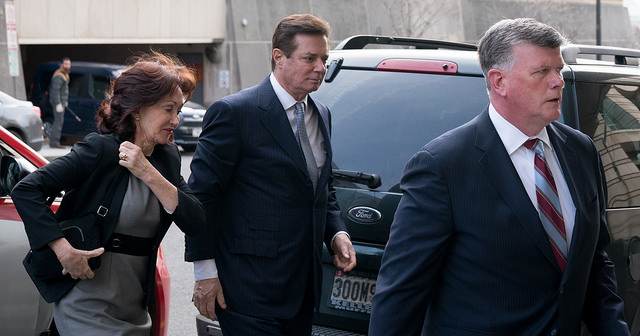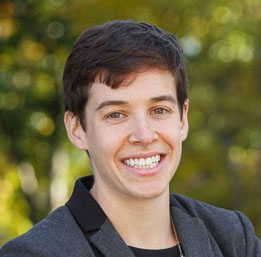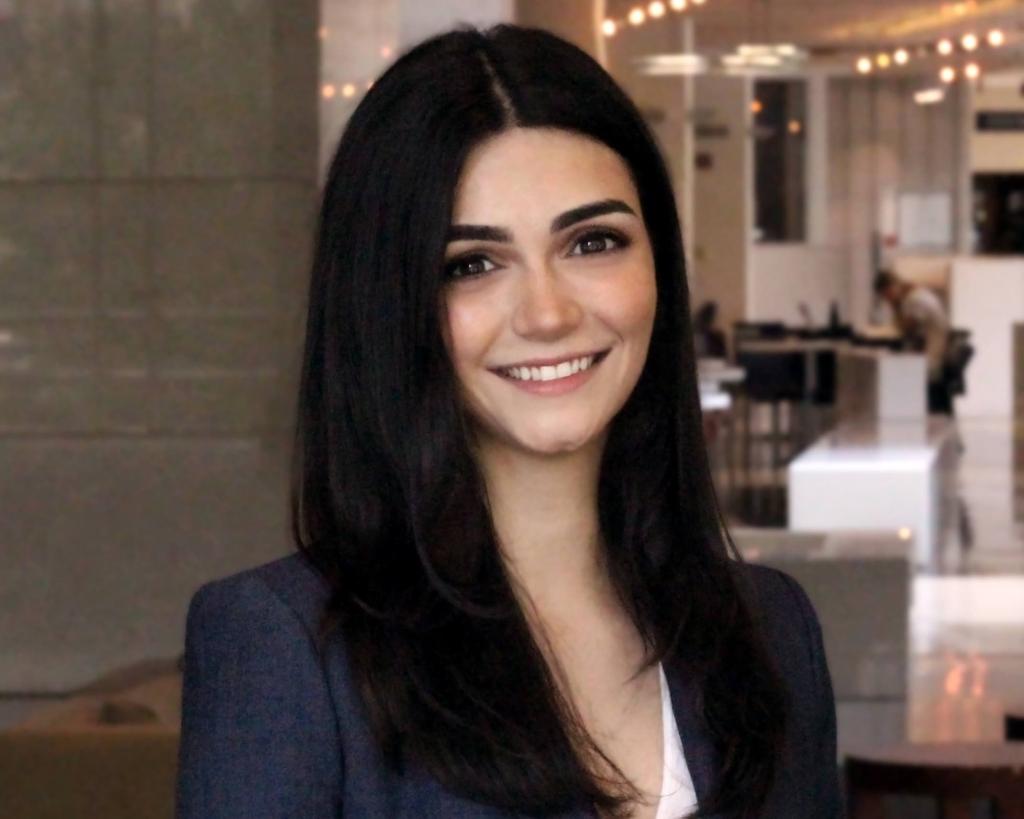Donald Trump, Paul Manafort and that Pesky Witness Tampering Statute
Is the president tampering with a witness by means of public tweets and media interviews?

Published by The Lawfare Institute
in Cooperation With

Donald Trump is swimming in dangerous waters. The day after his former campaign manager was convicted by a federal jury on eight felony counts, the president of the United States made a sequence of public statements praising Paul Manafort for refusing to cooperate with a lawful federal law enforcement investigation and for not “flipping” on the president—and, conspicuously, did not rule out a pardon.
In a tweet on Wednesday morning, Trump announced:
I feel very badly for Paul Manafort and his wonderful family. “Justice” took a 12 year old tax case, among other things, applied tremendous pressure on him and, unlike Michael Cohen, he refused to “break” - make up stories in order to get a “deal.” Such respect for a brave man!
— Donald J. Trump (@realDonaldTrump) August 22, 2018
And in an interview with “Fox & Friends” the same day, the president returned to the same theme: Cohen “makes a better deal when he uses me, like everybody else,” Trump said. “And one of the reasons I respect Paul Manafort so much is he went through that trial—you know they make up stories. People make up stories. This whole thing about flipping, they call it, I know all about flipping.” He added that such “flipping” was “not fair” and “almost ought to be outlawed.”
In the same interview, asked point-blank by “Fox & Friends” co-host Ainsley Earhardt whether he was “considering pardoning Paul Manafort,” Trump answered: “I have great respect for what he’s done, in terms of what he’s gone through. You know, he worked for Ronald Reagan for many years. … I would say what he did, the charges they threw against him, I’d say every consultant, every lobbyist in Washington probably does.” He then quickly changed the subject to Hillary Clinton, John Podesta and Peter Strzok.
Before making any more comments that a reasonable person in Paul Manafort’s shoes—or Robert Mueller’s shoes—might construe as urging Manafort not to “flip” or dangling the possibility of a pardon, there is a federal statute Trump might want to consult: 18 U.S. Code § 1512(b). That law makes it a federal crime “knowingly” to “corruptly persuade[] another person ... with intent to ... influence, delay, or prevent the testimony of any person in an official proceeding” or “cause or induce any person to withhold testimony . . . from an official proceeding.” It also makes it a crime to attempt to do so.
Like other obstructions of justice, the witness tampering statute requires proof beyond a reasonable doubt of specific corrupt intent on the part of the defendant. So don’t hold your breath for Mueller to leap to accuse the president of a violation. But Trump’s public signaling to Manafort is potentially important even if Mueller doesn’t treat it as a discrete obstruction of its own. The reason is twofold.
First, encouraging witness misbehavior, unlike firing officials or directing the conduct of federal law enforcement, is not plausibly within the president’s Article II functions. In urging a potential witness not to cooperate with a federal investigation that touches on his own conduct, the president is much more like a normal citizen before the justice system and much less distinctive, as even those most skeptical of the application of obstruction laws to the president concede. “The president can obstruct justice,” Josh Blackman makes clear, even in arguing that he “cannot obstruct justice when he exercises his lawful authority that is vested by Article II of the Constitution.” Tampering with a witness is not a lawful authority vested in Trump by Article II.
Second, to the extent that Mueller appears to be considering a pattern of obstructive behavior that includes internal executive-branch management abuses and public communications about law enforcement officials, the additional element of public communications directed at a particular potential witness to encourage that person’s non-cooperation seems significant. Not only does it show that the aggregate pattern does not consist wholly of Article II-authorized behavior, it also widens the scope and breadth of the corrupt behavior at issue.
All of which raises the question: Can you tamper with a witness by means of public tweets and media interviews?
There are a number of distinct legal issues here, some with clearer answers than others. The first is the question of “corrupt persuasion” and what it might mean as applied to a situation like this.
Section 1512 most famously prohibits the use of “intimidation” or threats to prevent a person from testifying or communicating with federal law enforcement about a possible federal crime. But somewhat less straightforwardly, as quoted above, Section 1512 also prohibits “corruptly persuad[ing] another person” to withhold testimony or to delay or refuse to speak with law enforcement. Federal courts are deeply divided, however, over what it means to “corruptly persuade” a potential witness—and that division has significant implications for Trump’s recent statements.
Some federal circuits, including the Second and Eleventh Circuits, have adopted an expansive interpretation of Section 1512(b). According to these circuits, the critical element is that persuasion must be done with an “improper purpose.” On this account, the criminal persuader need not adopt any particular means in inducing a second person not to speak with law enforcement; he or she might simply ask verbally with appropriately criminal intent. By this reading, one can even violate 1512(b) by persuading someone to invoke a legitimate privilege (such as a Fifth Amendment right against self-incrimination) if the persuader seeks in doing so to prevent his or her own implication.
By contrast, the Third and Ninth Circuits have adopted a more restrictive interpretation of Section 1512(b). On their reading, having an “improper purpose” is not enough. Persuading another person not to speak with law enforcement—even with intent to hinder an investigation or prevent one’s own incrimination—doesn’t itself make that persuasion “corrupt.” Rather, these circuits appear to demand that something about the means of the persuasion or the hindering of law enforcement must be corrupt. Thus, paying a financial reward to someone to remain silent, or encouraging someone to lie, would violate 1512(b) but simply asking someone to invoke her marital privilege would not.
The circuit split has clear implications for Trump’s recent statements. Under the expansive definition adopted by the Second and Eleventh Circuits, the president is almost certainly swimming in dangerous waters. When combined with other evidence, it is easy to see the president's Cohen-Manafort “flipping” discussion as an attempt to persuade Manafort not to cooperate with prosecutors. The tricky issue, of course, is still proving the president’s intent. But the act, persuasion, is relatively straightforward.
By contrast, under the more restrictive approach of the Third and Ninth Circuits, the case is slightly more difficult. Manafort, of course, has a Fifth Amendment right not to speak with law enforcement. So if all Trump is doing here is simply praising him for exercising that constitutional right, under these circuits’ precedent, the president can’t be violating Section 1512(b). Given, however, that these statements have been presented alongside a suggestive ambiguity about a pardon, it is not a great leap to read an implied offer into the president’s recent statements. If so, such an offer would look a lot more like the financial rewards that even these circuits understand as criminal.
This last point, perhaps, also relates back to one of the current authors’ debate with Blackman over the application of the obstruction statutes to the president. Under the understanding that prevails in the Second and Eleventh, it seems difficult for anyone (including Blackman) to argue that an otherwise criminal statement under Section 1512(b) would be protected by Article II. By contrast, under the understanding of the Third and Ninth Circuits, one could still argue that Trump’s conduct was protected. After all, the president’s use of pardons is part of his core Article II power. So the dangling of a pardon while suggesting that someone should not “flip” might arguably be more tethered to an actual exercise of Article II authority.
A second important question is whether Manafort counts as a “witness” under Section 1512. The answer to this question is that he most likely does. Although 1512 is known as the “witness tampering” statute, the term “witness” does not appear in the provisions relevant to this discussion. Instead, the statute specifies only that the target of corrupt influence efforts must be “another person”—or elsewhere, “any person.” The use of “person” rather than “witness” in Section 1512, which was enacted as part of the Victim and Witness Protection Act in 1982, was intentional and distinguishes it from the predecessor provision, Section 1503. As the U.S. District Court for the Eastern District of Pennsylvania explained in United States v. DiSalvo, affirmed by the Third Circuit,
the language of the statute was explicitly changed from “any witness” to “any person”, compare § 1503 with § 1512(a)(2), and the new statute expressly eliminates the requirement that there be a pending official proceeding. Compare § 1512(d)(1) with [United States v. Vesich, 724 F.2d 451, 457 (5th Cir.1984), reh’g denied, 726 F.2d 168 (1984)] (under § 1503 defendant must have knowledge of pending judicial proceeding). Second, the legislative history and purpose of the statute, enacted as part of the Victim and Witness Protection Act, indicate a congressional intent to broaden the scope of former section 1503 in order to offer greater protection to those with knowledge of criminal activity and to thereby encourage them to testify in official proceedings. See Pub.L. No. 97–291, § 2, 96 Stat. 1248 (1982). See also United States v. Hernandez, 730 F.2d 895, 897–99 (2d Cir.1984) (§ 1512 enacted to provide more extensive protection than § 1503).
Among others, the Second Circuit has expressly and repeatedly held that the language of Section 1512 covers potential witnesses, including those who have neither previously cooperated with the government nor expressed any intention or desire to cooperate. All that is necessary is for a defendant to believe a person might give information to federal officials and to act with the intent to prevent such communication. In any event, the broadening language may not be necessary to make the case here, as there is general consensus among the federal circuits that Section 1503 also covers potential witnesses, i.e. anyone who “knows or is supposed to know material facts, and is expected to testify to them, or to be called on to testify.”
Finally, there is the question of whether tweets or a nationally televised interview—which is to say, a public statement—as opposed to a communication made directly to targeted person, could implicate Section 1512. The answer here is that they probably could, but it is not entirely clear. There is a dearth of case law at the federal level on how public statements—like tweets or comments in TV interviews—would be treated under Section 1512, probably because most defendants are cautious enough to obstruct justice in private. But the fact that a statement is made in the public, or to a public audience, does not have any obvious effect on the application of the witness tampering statute. Nothing in the language of the statute addresses the manner in which “corrupt persuasion” or threats may be conveyed. And Section 1512 has successfully been applied to social media posts. We see no reason to imagine that statements made on television would receive a different treatment.
The cases that address use of social media tend to revolve around threatening statements. In U.S. v. Harris, for example, a woman was convicted under 18 U.S.C. § 1512(b)(1) for threatening potential witnesses in the criminal trial of her brothers. In addition to threatening witnesses in person and over the phone, Harris made threatening posts on Facebook, naming one potential witness, telling her to “[w]atch out little snitch” and warning her not to “get up on the stand.” Harris’s posts were part of a pattern of behavior, and it is unclear how the Facebook posts would have been treated in the absence of the other evidence—but, as with Harris’s posts, Trump’s tweets have not been made in a vacuum, and they could easily be used as part of a larger narrative.
We have not found any reported cases in which a defendant was convicted for tampering with a witness by means of a TV interview. This is not a particular surprise; most individuals with an interest in manipulating a witness do not have the platform to reach their intended target by television appearance, and most who do have access to television networks have the good sense not to use a platform readily available to the general public as their vehicle for criminal conduct. That said, the statute does not seem to rule it out.
In short, while Mueller’s prosecutors would be foolish to focus on the president’s comments about Manafort as a stand-alone obstruction matter, they could form part of a larger obstructive pattern—a part that exists outside of the exercise of core Article II presidential functions. More generally, just as no reasonable prosecutor would be likely to treat these statements alone as criminal acts in and of themselves, it is just as clear that no reasonable defense lawyer would want a client already facing investigation for obstruction making comments like these.






.png?sfvrsn=48e6afb0_5)

